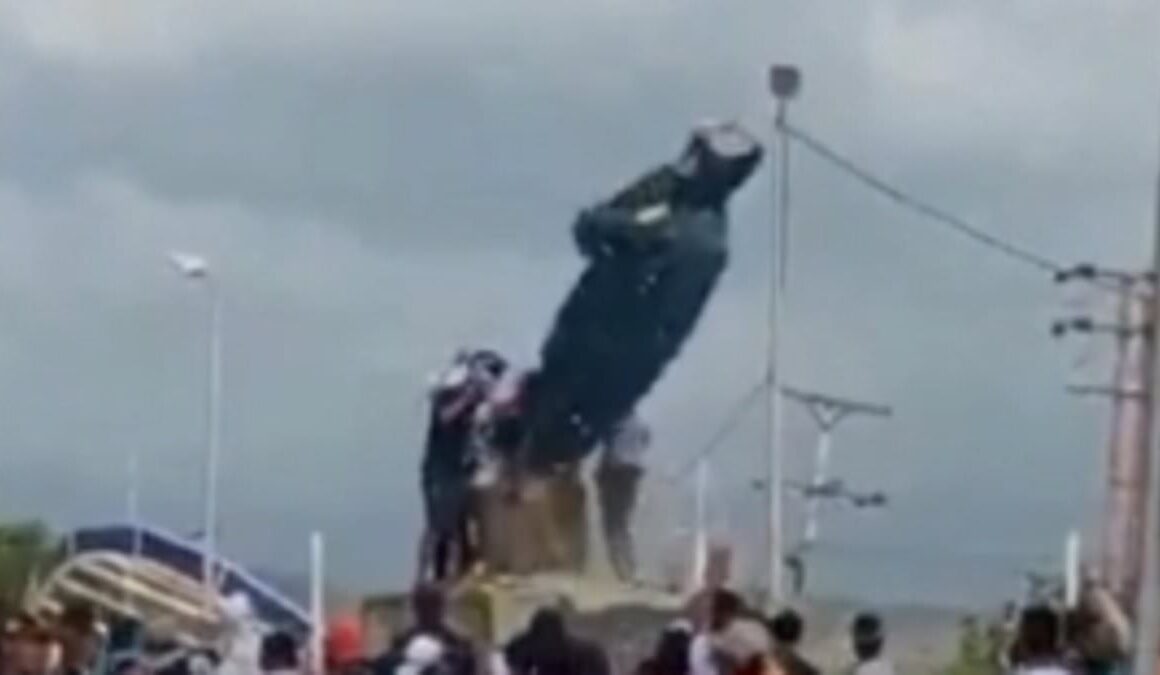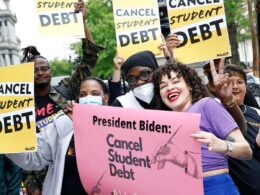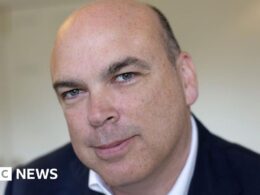Activists in Venezuela have toppled a statue of former president Hugo Chavez amid violent protests over the country’s disputed presidential election.
Chavez served as president of the South American country from 1999 until his death in 2013.
It comes as Marxist dictator Nicolas Maduro, who has previously been backed by ex-Labour leader Jeremy Corbyn, has been formally declared the winner of Venezuela’s presidential election.
Footage posted on social media shows people climbing upon the statue in Falcón State before dramatically toppling it – as large crowds cheer and throw their hands in the air.
The statue was knocked down in protest against Mr Maduro – amid claims of ‘serious irregularities in the counting and declared results’ of the election.

Footage posted on social media shows people climbing onto a statue of Hugo Chavez before toppling it

The statue was knocked down in protest against Nicolas Maduro
The National Electoral Council, which is loyal to Mr Maduro’s ruling party, announced his victory, handing him a third six-year term as the leader of an economy recovering from collapse and a population desperate for change.
The ministers of defence, communications, technology and the head of the National Assembly were among those in attendance who applauded.
‘We have never been moved by hatred. On the contrary, we have always been victims of the powerful,’ Mr Maduro said in the nationally televised ceremony.
‘An attempt is being made to impose a coup d’etat in Venezuela again of a fascist and counterrevolutionary nature.’
‘We already know this movie, and this time, there will be no kind of weakness,’ he added, saying that Venezuela’s ‘law will be respected’.
There was no immediate comment from the opposition, which had vowed to defend its votes. Opposition leaders planned to hold a news conference later in the day.
Within hours, a few thousand Venezuelans began taking to the streets near Caracas’ largest poor neighbourhood to protest Mr Maduro’s claim.
In the Petare neighbourhood, people started walking and shouting against Mr Maduro, and some masked young people tore down campaign posters of him hung on lampposts.
Heavily armed security forces were standing just a few blocks away from the protest, which was peaceful.
‘It’s going to fall. It’s going to fall. This government is going fall!’ some of the protesters shouted as they walked.
‘He has to go. One way or another,’ said Maria Arraez, a 27-year-old hairdresser, as she joined in the protest.

Large crowds cheer and throw their hands in the air after the statue falls down

Marxist dictator Nicolas Maduro, who has previously been backed by ex-Labour leader Jeremy Corbyn, was declared the victor by Venezuela’s electoral body

Venezuela’s reelected president Nicolas Maduro addresses after the results of the presidential election in Caracas, Venezuela on July 29, 2024
As the crowd marched through a different neighbourhood, it was cheered on by retirees and office workers who banged on pots and recorded the protest in a show of support. There were some shouts of ‘freedom’ and expletives directed at Mr Maduro.
Some protesters attempted to block freeways, including one that connects the capital with a port city where the country’s main international airport is.
Officials delayed the release of detailed vote tallies from Sunday’s election after proclaiming Nicolas Maduro the winner with 51% of the vote, compared with 44% for retired diplomat Edmundo Gonzalez.
The competing claims set up a high-stakes standoff.
‘Venezuelans and the entire world know what happened,’ Mr Gonzalez said.
The opposition vowed it would defend its votes, but Mr Gonzalez and his allies asked supporters to remain calm and called on the government to avoid stoking conflict.
Mr Maduro accused unidentified foreign enemies of trying to hack the voting system.
‘This is not the first time that they have tried to violate the peace of the republic,’ he said to a few hundred supporters at the presidential palace.
He provided no evidence to back the claim but promised ‘justice’ for those who try to stir violence in Venezuela.
Several foreign governments, including the US and the European Union, held off recognising the election results.
Caracas awoke as if it were a holiday, with some businesses shuttered, bus stops empty and traffic non-existent.
A few hours earlier, around midnight, a mix of anger, tears and loud pot banging greeted the announcement of results by the Maduro-controlled National Electoral Council.

Venezuelan President Nicolas Maduro (left) delivers a speech after learning the results of the presidential elections in Caracas, Venezuela on July 29

Venezuelan citizens gather to wait for the results of the presidential elections
Eating breakfast on a bench next to an unopened business, 28-year-old Deyvid Cadenas said he felt cheated.
‘The majority voted for the opposition,’ said Mr Cadenas, who cast a ballot in a presidential election for the first time. ‘I don’t believe yesterday’s results.’
After failing to oust Mr Maduro during three rounds of demonstrations since 2014, the opposition put its faith in the ballot box.
The elections were among the most peaceful in recent memory, reflecting hopes that Venezuela could avoid bloodshed and end 25 years of single-party rule.
The country sits atop the world’s largest oil reserves and once boasted Latin America’s most advanced economy.
But after Mr Maduro took the helm, it tumbled into a free fall marked by plummeting oil prices, widespread shortages of basic goods and hyperinflation of 130,000%.
US oil sanctions sought to force Mr Maduro from power after his 2018 re-election, which dozens of countries condemned as illegitimate.
But the sanctions only accelerated the exodus of some 7.7 million Venezuelans who have fled their crisis-stricken nation.
The opposition’s call for calm partly reflected protest fatigue among voters, who polls show are in no rush to upend their lives by taking to the streets as they have previously.
Voters lined up before dawn Sunday to cast ballots, boosting the opposition’s hopes it was about to break Mr Maduro’s grip on power.
The official results came as a shock to many who had celebrated, online and outside a few voting centres, what they believed was a landslide victory for Mr Gonzalez.
Gabriel Boric, the leftist leader of Chile, called the results ‘difficult to believe,’ while US Secretary of State Antony Blinken said Washington had ‘serious concerns’ that the announced tally did not reflect the actual votes or the will of the people.
The US-based Carter Centre called on Venezuelan authorities to immediately publish the tallies of 30,000 individual voting machines from the election.
The centre in Atlanta sent a small group to Venezuela for the election.
It said the missing polling station data was ‘critical to our assessment and important for all Venezuelans’.
Opposition leader Maria Corina Machado said the margin of Mr Gonzalez’s victory was ‘overwhelming,’ based on tallies the campaign received from representatives stationed at about 40% of ballot boxes.
Authorities postponed releasing the results from each of the 30,000 polling booths nationwide, promising only to do so in the ‘coming hours’.
The delay hampered attempts to verify the results.









